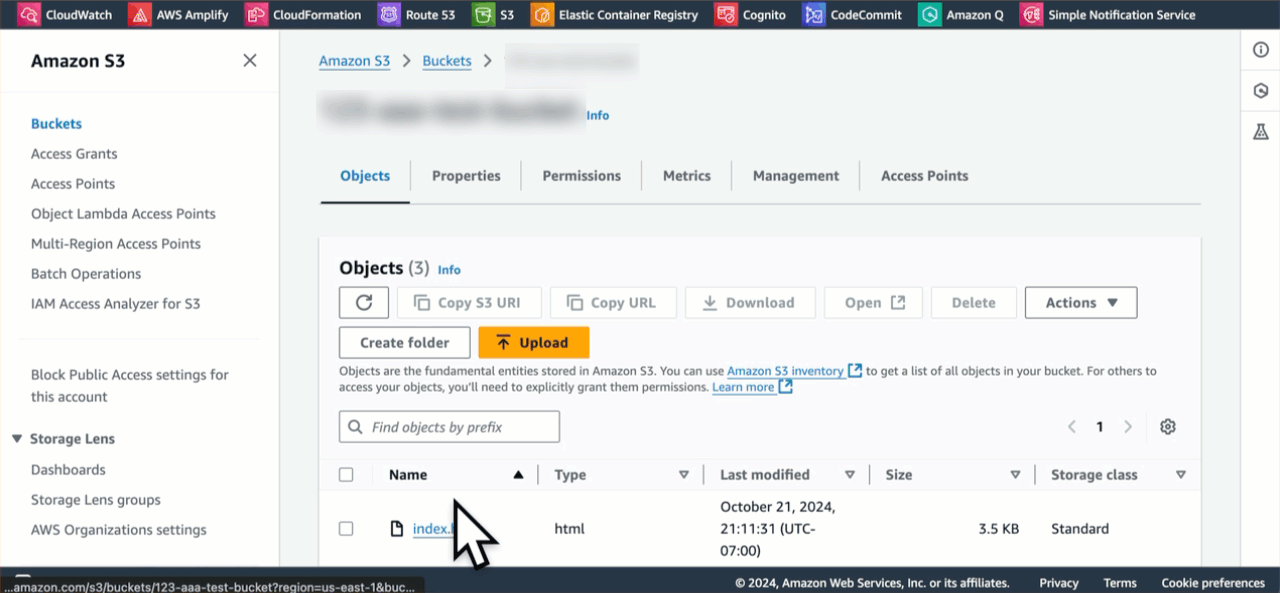
Simplify and enhance Amazon S3 static website hosting with AWS Amplify Hosting

Now, I have my static site ready, and I can check it out at https://donnie…We are announcing an integration between AWS Amplify Hosting and Amazon Simple Storage Service (Amazon S3)… AWS Amplify Hosting is a fully managed service for hosting static sites that handles various aspects of depl…
We are announcing an integration between AWS Amplify Hosting and Amazon Simple Storage Service (Amazon S3). Now, you can deploy static websites with content stored in your S3 buckets and serve over a content delivery network (CDN) with just a few clicks.
AWS Amplify Hosting is a fully managed service for hosting static sites that handles various aspects of deploying a website. It gives you benefits such as custom domain configuration with SSL, redirects, custom headers, and deployment on a globally available CDN powered by Amazon CloudFront.
When deploying a static website, Amplify remembers the connection between your S3 bucket and deployed website, so you can easily update your website with a single click when you make changes to website content in your S3 bucket. Using AWS Amplify Hosting is the recommended approach for static website hosting because it offers more streamlined and faster deployment without extensive setup.
Here’s how the integration works starting from the Amazon S3 console:

Deploying a static website using the Amazon S3 console
Let’s use this new integration to host a personal website directly from my S3 bucket.
To get started, I navigate to my bucket in the Amazon S3 console . Here’s the list of all the content in that S3 bucket:

To use the new integration with AWS Amplify Hosting, I navigate to the Properties section, then I scroll down until I find Static website hosting and select Create Amplify app.

Then, it redirects me to the Amplify page and populates the details from my S3 bucket. Here, I configure my App name and the Branch name. Then, I select Save and deploy.

Within seconds, AWS Amplify has deployed my static website, and I can visit the site by selecting Visit deployed URL. If I make any subsequent changes in my S3 bucket for my static website, I need to redeploy my application in the Amplify console by selecting the Deploy updates button.

I can also use the AWS Command Line Interface (AWS CLI) for programmatic deployment. To do that, I need to get the values for required parameters, such as APP_ID and BRANCH_NAME from my AWS Amplify dashboard. Here’s the command I use for deployment:
aws amplify start-deployment --appId APP_ID --branchName BRANCH_NAME --sourceUrlType=BUCKET_PREFIX --sourceUrl s3://S3_BUCKET/S3_PREFIXAfter Amplify Hosting generates a URL for my website, I can optionally configure a custom domain for my static website. To do that, I navigate to my apps in AWS Amplify and select Custom domains in the navigation pane. Then, I select Add domain to start configuring a custom domain for my static website. Learn more about setting up custom domains in the Amplify Hosting User Guide.

In the following screenshot, I have my static website configured with my custom domain. Amplify also issues an SSL/TLS certificate for my domain so that all traffic is secured through HTTPS.

Now, I have my static site ready, and I can check it out at https://donnie.id.

Things you need to know
More available features – AWS Amplify Hosting has more features you can use for your static websites. Visit the AWS Amplify product page to learn more.
Deployment options – You can get started deploying a static website from Amazon S3 using the Amplify Hosting console, AWS CLI, or AWS SDKs.
Pricing – For pricing information, visit Amazon S3 pricing page and AWS Amplify pricing page.
Availability – Amplify Hosting integration with Amazon S3 is now available in AWS Regions where Amplify Hosting is available.
Start building your static website with this new integration. To learn more about Amazon S3 static website hosting with AWS Amplify, visit the AWS Amplify Hosting User Guide.
Happy building,
— Donnie
Author: Donnie Prakoso
